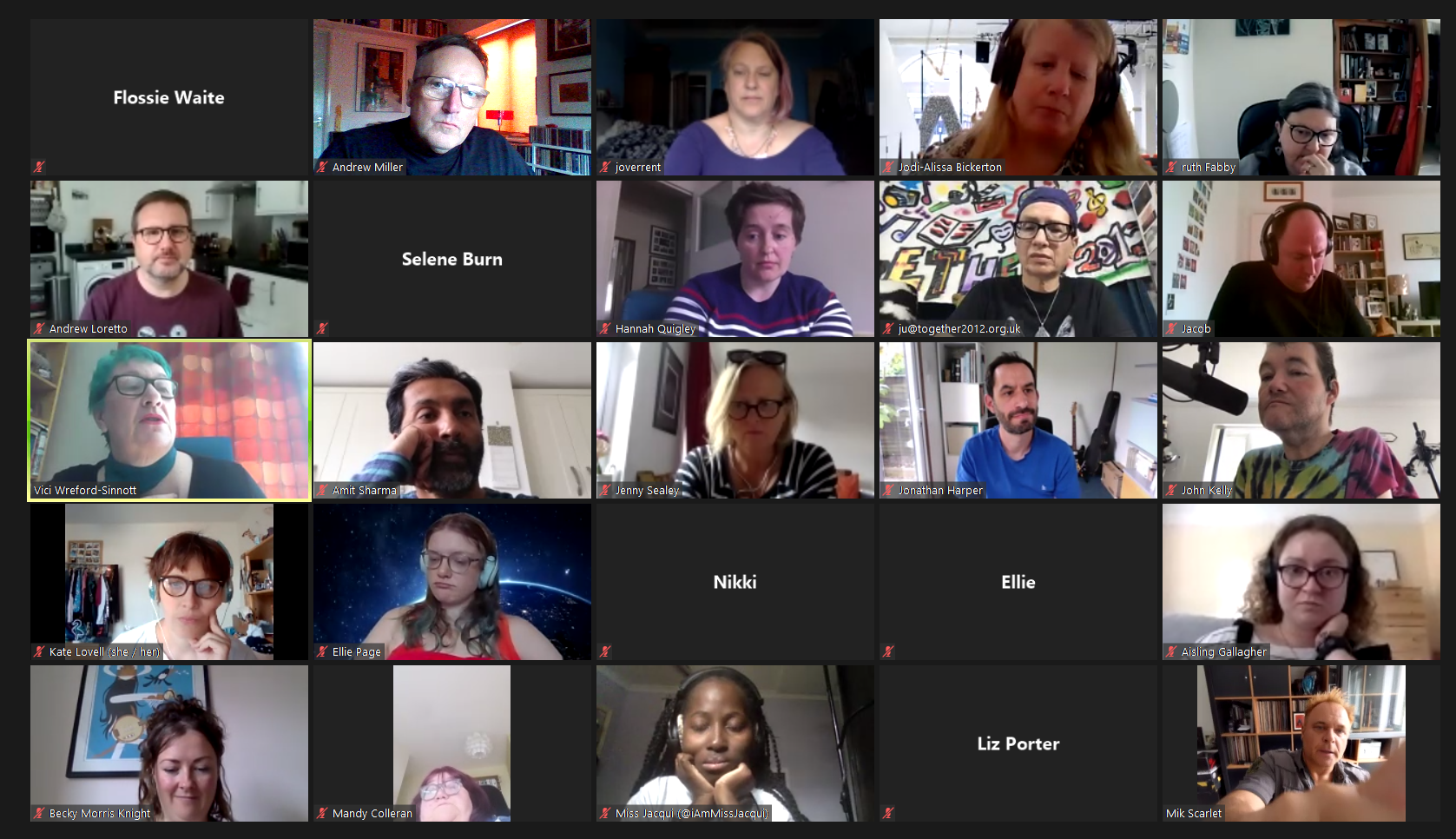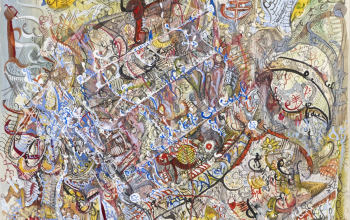It is with great pleasure that I introduce you, and invite you, to a new UK Disability Arts Alliance, #WeShallNotBeRemoved !
#WeShallNotBeRemoved is an alliance of UK-based disabled artists across all forms, disabled workers within the creative industry and disability led arts organisations. The group’s community currently exists mainly on Slack, and any disabled practitioners whose descriptions match the above can join by sending an email asking to be added to the group to ellie@stillill.uk. You can use Slack in your web-browser, and do not have to have any particular technology other than a phone/tablet/laptop/computer with internet access. There is a great deal of accessibility information and how-to guides within the Slack forum, but if you are having any issues please let someone know.
I was fortunate enough to grab one of #WSNBR founding members, UK Government Disability Champion for Arts and Culture Andrew Miller, just a couple of days before our first members meeting on Zoom, attended by – at my last count – 101 disabled creatives around the UK!

An Emergency Response to an Emerging Crisis
The #WeShallNotBeRemoved movement is being called an ‘Emergency Response’. I wondered if at any other point in his career, Andrew had felt that he was in a time which felt like a “crisis” in need of an emergency response?
“No, certainly not. Not like this, anyhow. I mean there was the 1980’s disability movement, and that felt like a very important moment then. That was undoubtedly an important moment to get things off the ground, the whole ‘Nothing about us, without us’ campaign. After that, of course, everyone’s gone into their different art forms, different impairment groups, and it’s all started to flow. Disability arts and inclusive arts has grown exponentially over the last thirty years very successfully. I think it’s actually one of the real ‘British success stories’, to use a government phrase.”
I hadn’t thought of the UK disability arts scene as an authority within a global context, but it’s true – we are global leaders in the inclusive arts industry in the UK, and many countries look to us in terms of the models and policies we use. Then what is it that we want from #WSNBR and why now? Have we not had a reason to come together since then?
“It’s not only a real point of existential threat to the arts, which is the thing that binds us all, that we all love, but there’s also this huge threat to us personally.”
Whatever your disability, or impairment, there is an implicit threat to you and your very life by this illness. Disabled people, including those with underlying health conditions, are disproportionately affected by the severity of coronavirus; it is not just our industry but our lives that are at stake. No statistics have been provided yet on the number of disabled cases and deaths in the UK, although Office for National Statistics (ONS) should be publishing these towards the end of the month. It’s the combination of these forces, particularly their immediacy, that Jo, Andrew and others feel means something needs to happen.
How do we do it? How do we make change on that level?
There have been phenomenal, admirable and heart-wrenching waves of #BlackLivesMatter protests taking place all over globe, since the brutal murder of George Floyd by police in Minneapolis, on 25th May. We are usually not able to garner such a widespread physical presence for our voice so what can we do to help make sure disabled voices heard by those in power? We pray that #BlackLivesMatter protesters all over the world are being listened to by authorities right now, as there has perhaps never been a bigger or more powerful demonstration of defiance against institutional racism.
How does a muffled voice become explosively loud, having been silenced for so long, especially in the current climate of us needing to ‘shield’ at home?
There are a number of ways to make sure the online movement is cohesive and loud, though Andrew says it also helps ‘to be a bit bloody-minded!’
“You have to bring everyone together to have a voice, especially a voice that anyone is going to want to listen to.”
The project has been clear from the start that it needs to be cross-artform, cross-impairment group, and cross-UK. “You have to bring everyone together to have a voice, especially a voice that anyone is going to want to listen to”. Of course, this means taking accountability for any inequalities within this alliance and fighting in the correct way to address these. Thankfully, this was a topic explored during our first #WSNBR meeting, however we need actions and systems to change following such discussions, and not to have them left at just that: discussions.
There is a lot of noise at the moment, and a lot of voices are clamoring to be heard, each with unique, individual and worthwhile cases. We as disabled people need the government to realise that we are doubly threatened by COVID-19; not only has the art sector ground to a halt, but our individual lives are disproportionately threatened by this too. As a consequence numerous disabled artists are going to have to long-term shield and risk invisibility as a consequence, putting the case of disability arts backwards by a decade if not more.
Encouraging an Entourage
Andrew points out that we have often been a fragmented sector, and that his approach to steering this has been to encourage people to join with “kindness and respect”, to not let our focus get hung up on terminology and identity, and focus on two very simple aims; firstly to amplify our voices and secondly, to campaign for a more inclusive cultural sector.
“What binds all of us together is we agree that the industry that closed down in march didn’t work very well for a lot of us. There were improvements, but not enough.”
Whether #WSNBR will be a time-limited intervention or take off and become a fully-fledged organization, or a future as a support body, no one really knows, but that’s what makes it so beautiful and exciting to be a part of. At the moment, the focus is on the immediate task in hand, and every disabled artist & creative industry worker is invited to join.
“Let’s see what we can pull together ourselves without funding, without money, and see what we can do that is better than what we might do individually”. The aim is to try and keep it a very loose alliance, so people don’t feel like they’re sacrificing too much by being a part of it.
We are fortunate as a fledgling movement to have founding voices such as Andrew’s, as his position as UK Champion for Disability in Arts & Culture requires direct reporting to The Cabinet Office, and regular dialogue with the Department for Digital, Culture, Media and Sport. In other words, hopefully, a direct line of communication to those in charge, aided by the early involvement of strong corporate voices within the industry like Graeae Theatre Company, Candoco, Shape Arts, Unlimited, Arts Professional, The Stage and more.
Those who started the movement are anxious to make sure that there is a sense of ownership among members; there is no hierarchy and it is hoped that people involved will start shaking up the agenda themselves. “At the moment it is being shaped by those of us who have set the thing up, but we are all very happy to take a step back once everyone else is ready to take a step forward. The alliance does not belong to me, or Jo Verrant, or Jenny Sealey, it’s not any of ours. We’ve just created this space and now it’s yours to shape and turn it into what you want and need it to be”.
Expect to see a lot more about #WeShallNotBeRemoved over the coming months, and please either get involved or expand our platform by sharing with friends and colleagues.
Any questions, get in touch on Twitter @stillillok or email ellie@stillill.uk!



